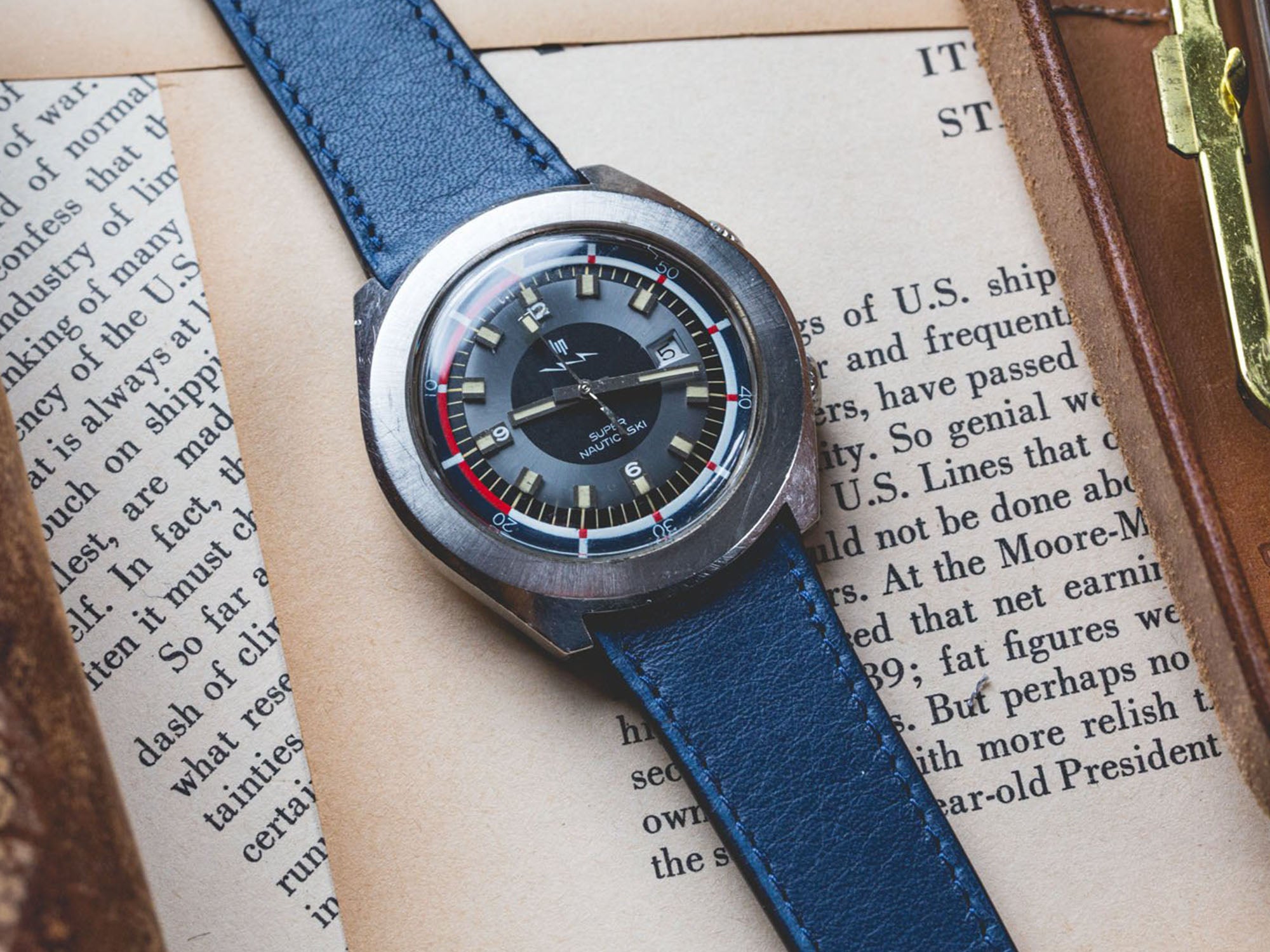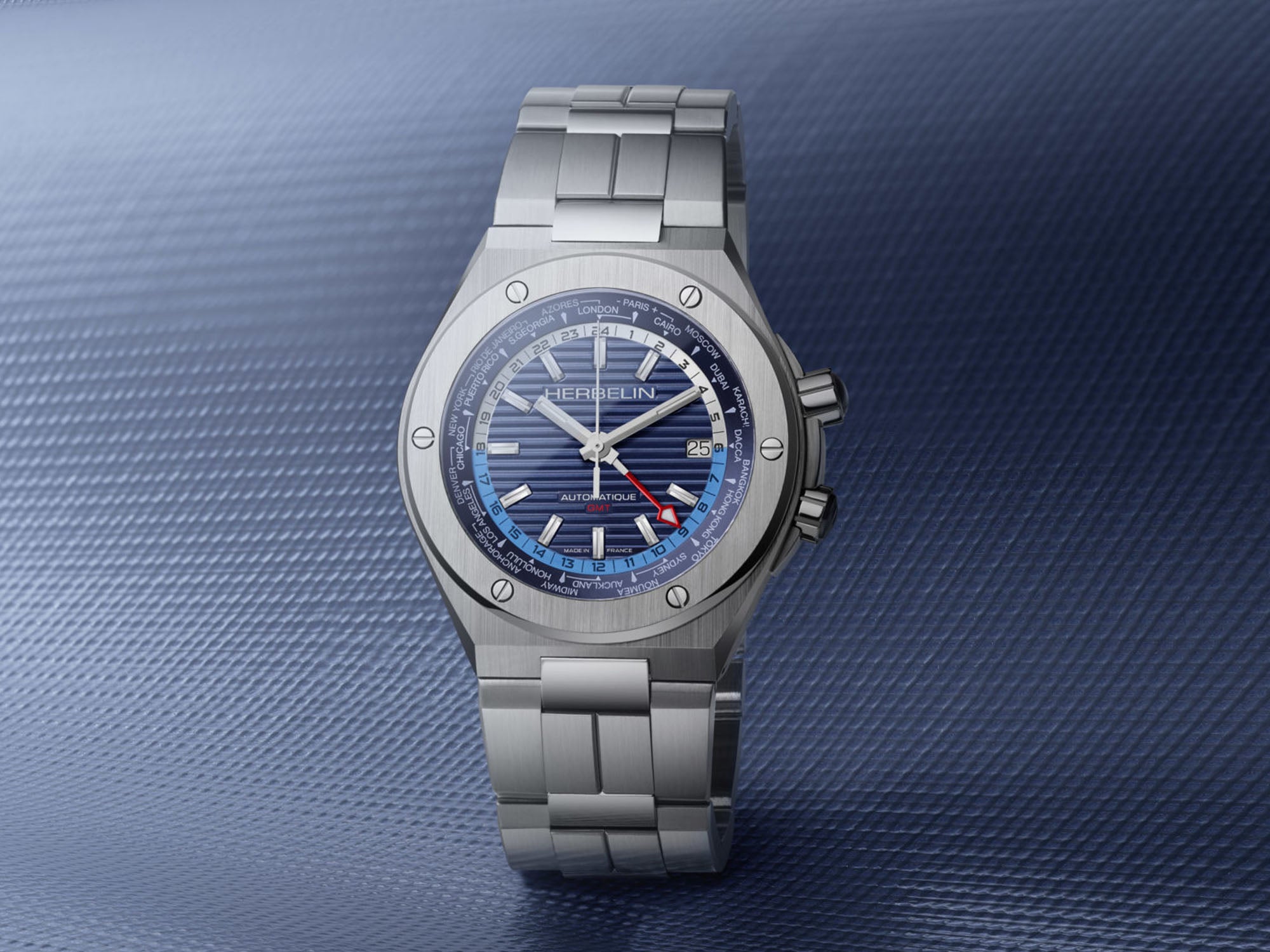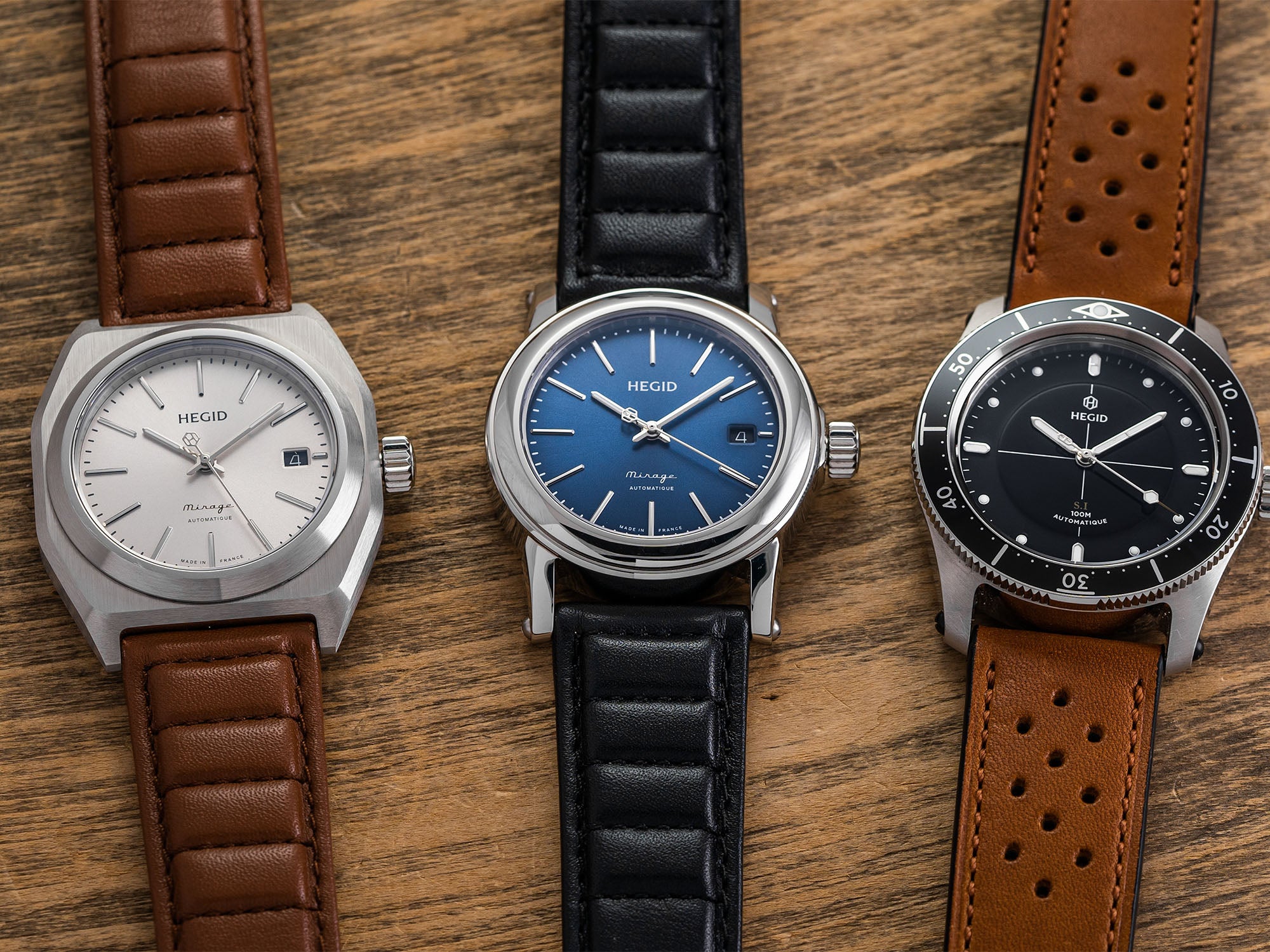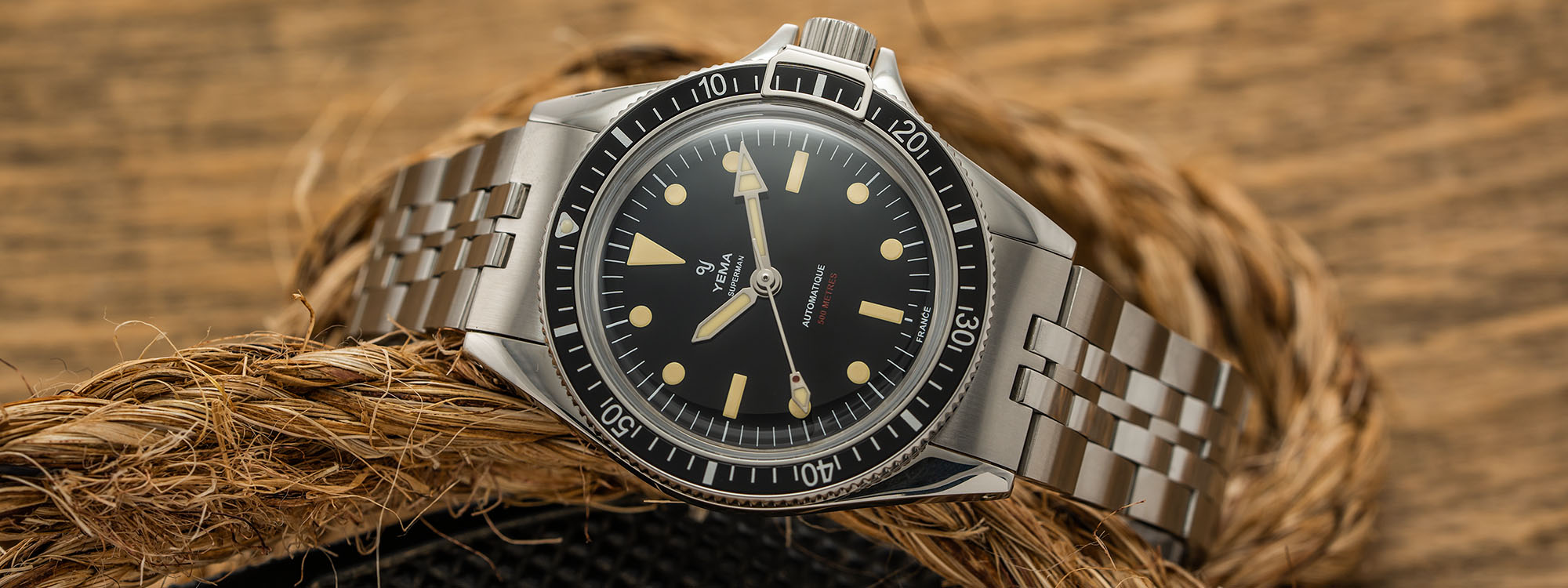Switzerland is the modern world’s center of watchmaking, with Germany a distant but respectable second in Europe and Japan having long staked out its own spot as the premier watch producer in Asia. Great Britain and the U.S.A., while no longer world leaders, both have a proud history of watchmaking and maintain a small but steadily growing cottage industry in the modern era. But France has its own respectable horological heritage, centered around the commune of Besançon (below), which borders Switzerland’s own heartland of watchmaking, the Vallée de Joux.

France was, in fact, a home for many historically significant watchmakers and clockmakers, including Julien Cordray, Jean-Antoine Lépine, Ferdinand Berthoud, and Abraham-Louis Breguet (actually born in the Prussian principality that would become Neuchâtel, Switzerland, but renowned as a Paris-based watchmaker to French royalty). The latter three all plied their trade in workshops on Place Dauphine at the western tip of Paris' Île de la Cité in the Seine. Watchmaking was a thriving industry in France for a century, up until KIng Louis XIV’s (below) revocation of the Edict of Nantes in 1685, which ushered in the religious persecution of Huguenot watchmakers, who fled to Switzerland to essentially establish that nation as a horological power. The French Revolution in the 18th Century, which halted the sales of luxury goods like watches in France, further eroded the country’s watch industry, and it has never returned to its early levels of prominence, despite a handful of French watchmakers keeping the spirit of horological innovation and entrepreneurship alive into the 21st Century.

In this feature we showcase 10 notable French watch brands that are active today, ranging from venerable maisons founded before the 20th Century to boutique brands and microbrands that have established themselves on the horological scene in just the past few years. Some caveats: These brands all identify as French and have their HQ within the borders of France and in most cases assemble their watches in a French factory. The list does not include watch brands founded by Frenchmen but which make watches in Switzerland, i.e., Cartier and F.P. Journe; or owned by French companies but make watches in Switzerland, i.e., Hermès, Louis Vuitton, Van Cleef & Arpels, and Bell & Ross. You also won’t find Breguet included here, even though the founder made his legendary name as a Parisian watchmaker; today’s Breguet is unmistakably Swiss. Basically, if a watch touts its “Swiss Made” bonafides, we’re not calling it a French watch. Without further ado, allons-y!
BALTIC WATCHES
 Founded: 2017
Founded: 2017
Headquarters: Paris, France
Founder: Étienne Malec
Notable models: HMS 002, Bicompax 002, Aquascaphe Classic and Dual Crown
Baltic Watches founder Étienne Malec found the inspiration for his watchmaking enterprise with the discovery of his father’s watch collection, and named the company, launched on Kickstarter in 2017, to honor his father’s roots, after the sea off the northern coast of Poland. The goal from the start, according to Malec, was to produce “timeless pieces, of the highest quality, for fair prices.” The watches are all assembled in a workshop in Besançon and evoke vintage pieces like the ones Malec’s father collected and extensively catalogued in his journals. The first Baltic watches were the three-hand HMS 001, with a Japanese Miyota caliber, and the hand-wound Bicompax 001 chronograph, with the Chinese Seagull ST19 movement. Baltic has become most known for its Aquascaphe series of dive watches, which take their design inspiration from mid-20th-century divers and are equipped with automatic Miyota movements. The Aquascaphe Classic models in steel feature the classical unidirectional dive-scale bezel while the Aquascaphe Dual Crown models use a crown-operated, bidirectional, internal bezel in the style of vintage compressor dive watches. Baltic has since introduced Aquascaphe models in titanium and bronze cases.
BRM CHRONOGRAPHES

Founded: 2004
Headquarters: Magny-en-Vexin, France
Founder: Bernard Richards
Notable models: V6-44, V12-44, MK-44, R50, DDF6
BRM started in 2004, springing from a collaboration between motorsport enthusiast and luxury-industry entrepreneur Bernard Richards and watchmaker Jean-Paul Crabbe (the initials stand for “Bernard Richards Manufacture”) and training its creative focus on artisanal timepieces taking design and technical cues from the automotive world. BRM has cultivated strong ties with the world of auto racing, including partnerships with the Corvette Racing team, the Porsche Club of America, and drivers Dario Franchiti and Paul Bocuse, Jr. The brand, which makes its watches at Magny-en-Vexin in Northern France, was one of the pioneers of personalization, offering an online Watch Configurator on its website that allows customers to choose the style, color, and material for various elements of their watch. Its array of engine-named pieces include the best-selling V6 and V12; the R50, the first watch with a floating movement on carbon triangles; the MK44, touted as the lightest self-winding watch with a case made of a robust polycarbonate called Makrolon; and the titanium-cased DDF6 and DDF12, whose case design is inspired by disk brakes.
MAISON DODANE

Founded: 1857
Headquarters: Besançon, France
Founders: Alphonse Dodane, Francois-Xavier Joubert
Notable models: Type 21 Heritage, Type 23 Flyback, Type 23 GMT
Founded in La Rasse on the Franco-Swiss border in 1857 by Alphonse Dodane and his father-in-law Francois Xavier Joubert, the Dodane Watch Company moved to Besançon in 1929 and made its most enduring historical mark as a provider of flyback chronograph pilot’s watches for civilian and military pilots, including as an official supplier of NATO. The company, now in its fifth generation of family ownership and management, has been heavily involved in aviation ever since: in addition to wristwatches, Dodane has produced onboard instrument panel-clocks for combat jets as well as timers for parachute jumps and ejection seats. The flagship of Dodane’s modern collection is the Type 21 chronograph and its various versions (including models with flyback functionality, GMT, and power reserve indication), a revamped version of the timepiece provided to French fighter pilots in the 1950s. Dodane watches are designed and assembled in France, with parts sourced from suppliers in France as well as Switzerland.
LEROY

Founded: 1747
Headquarters: Besançon, France
Founders: Basile, Julien, and Pierre Le Roy
Notable models: Osmior Single Push-Piece Chronograph, Marine Automatic Deck Chronometer
The name Le Roy is among the most prestigious names in French watchmaking history. Julien Le Roy was the official clockmaker to King Louis XV and is credited with devising the first timepiece that marked the seconds. His son Pierre was the inventor of the detent escapement and the isochronous balance spring and succeeded his father as clockmaker to the royal court. Basile Le Roy, who established the company now known as Leroy in 1785 in the arcades of Paris’ Palais Royale, was a descendant of this multigenerational watchmaking dynasty, whose spirit lives on in a series of contemporary timepieces. Leroy watches are assembled in Besançon and contain Swiss-made movements from the Vallée de Joux; the movements are chronometer-certified at the Besancon Observatory, the only such testing facility in France. Among the maison’s notable watches are its Osmior models, notably the Osmior Single Push-Piece Chronograph; the term refers to a metal alloy developed by Leroy back in the early 1900s for its high-complication watches, made up of mostly gold and boasting a platinum-like luster. The Marine collection of high-end chronometers, meanwhile, is a family of timepieces paying tribute to Leroy’s history as watchmaker to the French Navy from 1835 through the 1980s.
LIP WATCH CO.

Founded: 1844
Headquarters: Besançon, France
Founder: Emmanuel Lipmann
Notable models: Nautic-Ski, Rallye Chrono, Himalaya, T18
Among France’s watchmakers, Lip may be the one that has made the biggest impact in the 20th Century. Founded by Jewish Alsatian watchmaker Emmanuel Lipmann, Lip can lay claim to the first phosphorescent watch dials (invented by none other than Pierre and Marie Curie, friends of Emmanuel’s son and successor, Ernest Lipmann); the first distribution network for watches in France; the first electronic wristwatch in 1952; and the first watch water-resistant to 200 meters, the legendary Nautic-Ski, in 1967 (modern example pictured). Today’s Lip watches are developed, cased and adjusted at the main industrial site in Besançon, and sold and distributed from another site in Lectoure; parts are sourced from Asia and Switzerland, along with straps made by a supplier in France. The company’s diverse collection includes the modern version of the Nautic-Ski sport watch, with a bidirectional internal dive bezel and a Miyota movement; the Rallye collection of chronographs inspired by 1960s-’70s auto racing; and the rectangular-cased, Art Deco-styled Churchill dress watches, based on the T18 model gifted by the company to Winston Churchill after World War II.
MICHEL HERBELIN

Founded: 1947
Headquarters: Charquemont, France
Founder: Michel Herbelin
Notable models: Cap Camarat, Newport, Trophy, Epsilon, Galet
Michel Herbelin started his eponymous watchmaking company at the age of 26, sourcing components from both France and nearby Switzerland and operating initially out of his parents’ home in Charquemont, near the Swiss border. He called his first watch the “Impecc,” short for “impeccable,” as a signifier of the horological seriousness and design elegance that he wanted to bring to his products. The company passed from Michel to his sons (who embraced the rise of quartz in the watch industry and saw it as an opportunity for design creativity) and eventually to his grandsons, and remains family-owned and managed. Today, Herbelin watches are still designed, assembled and tested at the company’s workshop in the region of Franche-Comté. The Cap Camarat collection, which descends aesthetically from watches of the 1960s, is the brand’s crowd-pleasing, integrated-bracelet sport-luxury model, outfitted with a Swiss quartz movement from Ronda. Watches in the recently launched Newport collection have a similarly sporty, nautical aesthetic, with exposed screws on their bezels and containing either a quartz Ronda or an automatic Sellita movement inside their steel cases.
PEQUIGNET

Founded: 1973
Headquarters: Morteau, France
Founder: Emile Pequignet
Notable models: Royale Titane, Royale Grand Sport, Exagone Skeleton
The artisanal watchmaking house founded in 1973 by Emile Pequignet in the Franco-Swiss Jura Mountains proudly proclaims its status as “one of the last independent watchmaking firms that still retains control over their creations and production.” Pequignet is still based in its original building in the town of Morteau and since 2014 has been recognized as a “Living Heritage Company” by the nation of France for its promotion of industrial excellence and craftsmanship. Among the examples of this dedication is the company’s in-house movement, Calibre Royal, a self-winding caliber with an 88-hour power reserve that animates the award-winning Rue Royale timepiece and others in the Royale collection, some of which are distinguished by multiple complications including moon-phases, large dates, and analog power reserves. Pequignet also uses Swiss mechanical movements in some of its other exceptional pieces, like the skeletonized Sellita SW200 in its Exagone Skeleton and the quartz Ronda in the multifunctional Equus models.
YEMA

Founded: 1973
Headquarters: Besançon, France
Founder: Henry Louis Belmont
Notable models: Heritage Superman, Rallygraf, Flygraf, Wristmaster
Founded in Besançon in 1948 by watchmaker Henry Louis Belmont, Yema has had an up-and-down history in the watch world, with ownership changing several times over the years (including a stint in the 1980s when it was owned by Seiko). In 2005, under new French ownership, Yema returned to the scene after a long hiatus and began offering a vast range of watch styles, including the racing-inspired Rallygraf chronograph, the retro-futuristic LED models, and the Flygraf GMT models that emerged from a partnership with the French Air Force, one of Yema’s many projects in its role as partner of France’s Armed Forces. By far the most emblematic Yema watch is the Superman divers’ series, which first debuted in 1963 and which still boasts a loyal following. The Heritage Superman (pictured) is the modern model most faithful to the original, with its distinctive bezel locking device that’s operated through the crown and its case’s impressive 300-meter water resistance. Yema uses proprietary third-party-produced movements in many models, but opts for the tried-and-tested Swiss Sellita SW200 in this and other dive watches.
SERICA

Founded: 2019
Headquarters: Paris, France
Founder: Jérôme Burgert
Notable models: 5303 dive watch, 4512 field watch, 8315 GMT
Serica is one of the youngest brands on this list, founded in 2019 in a collaboration between the watch blog “Les Rhabilleurs'' (specifically its former editor, Jérôme Burgert) and the WM Brown Project, established by sartorial expert and A Man & His Watch author Matt Hranek. Following up the company’s first release, a “Dirty Dozen”-style field watch called the W.W.W. William Brown Edition, is its first divers’ watch, the distinctly designed 5303 series, with high-end bonafides including sunray finishing on the bezel, mirror polishing on the articulated lugs, and an aluminum and ceramic dive-scale bezel with a countdown function. Rounding out the collection are the 4512 field watches, with old-school minute track and 24-hour scale, and the 8315 GMT models with a bicolor 24-hour bezel insert made of a monobloc of ceramic. Serica tests the automatic Soprod Newton movements inside the watches to plus/minus four seconds per day, which speaks to the watches’ performance as well as the founders’ attention to detail.
HEGID

Founded: 2015
Headquarters: Paris, France
Founders: Emeric Delalandre, Henric Gauché, & Gregory Gauché
Notable models: Celeste Steel, Blue Mirage, Laboratoire Colorama
Many watch brands have embraced customization (see BRM above), but few have made it as essential to their identity as Hegid, a microbrand founded in Paris in 2015 by watch designing brothers Henrick and Gregory Gauche and former Apple digital engineer Emeric Delalandre. Hegid watches have gained a following for their modular case system — called “EVOL,” representing the brand motto of “Make Your Evolution” — that allows the wearer to swap out the dial and movement of the watch quickly and easily and as often as one likes. The dial and the movement behind it are collectively called the “capsule,” while the case, or “carrure,” and the bracelets are separate pieces that can be interchanged in about 10 seconds, without tools, to create an entirely new look. Hegid is proudly fashion-oriented and proudly French, with 80 percent of its watches’ elements coming from French suppliers; the remaining parts are Swiss, including the movements in the “capsules,” sourced from Sellita. The case options include the round Labaratoire, the tonneau-shaped Mirage, and the most defiantly unconventional, the sharply angular Celeste.
DEPANCEL

Founded: 2018
Headquarters: Besançon, France
Founder: Clément Meynier
Notable models: Serie-R, D[R}iver, Allure Chronograph
Founded in 2018, French microbrand Depancel, based in Besançon, makes wristwatches that are influenced by motorsports and automotive culture. Engineer and brand founder Clément Meynier took the name from a triple portmanteau of Delage, Panhard, and Facel Vega, three historic French car manufacturers, and his brand’s timepieces are designed to evoke the glory days of auto racing — with dashboard-style hands and perforated leather straps evoking the look of racing gloves. The square-cased Serie-R models are a clear homage to early Heuer Monaco models, albeit using their tricompax dials for calendar indications rather than chronograph readouts, while the sleek, round Allure Chronographs feature bicompax dials, pulsometer bezels, and “Big Eye” subdials. The cleverly named, nautical-inspired D[R]iver models take cues from the designs and colors of 1970s Cigarette racing boats. Movements are sourced from Japan’s Miyota and Switzerland’s Sellita, and the watches are all assembled in France.
CHARLIE PARIS

Founded: 2014
Headquarters: Paris, France
Founders: Adrien Sanglé-Ferrière and Ambroise Parlos
Notable models: Initial, Aurore, Concordia, Alliance
Two childhood friends with a passion for watches teamed up to establish Charlie in 2014, basing the company in Paris and devoting themselves to the mission of making watches that are both durable and elegant, as well as eco-friendly and true to French watchmaking traditions. All the brand’s watches are designed and assembled in a Parisian workshop, with leather straps sourced from certified sustainable tanneries. Among its bestsellers are the Initial Skeleton, a classically elegant round watch with an openworked dial offering a view of the skeleton automatic movement (sourced from Miyota); the sporty GRX-EVO-III chronograph, with a MechaQuartz movement and colorways and design elements drawn from the world of Alpine skiing; and the Soprod-equipped Concordia GMT, a sleek but rugged tool watch with a dual-time bicolor flange on which to read a second time zone in 24-hour format on a central GMT hand.
BEAUBLEU

Founded: 2017
Headquarters: Paris, France
Founder: Nicolas Ducoudert
Notable models: Ecce, Figura, Seconde Français
French designer Nicolas Ducoudert established BeauBleu in 2017, drawing upon his experience in the automotive and luxury goods industries to create the unique look of the company’s watches, identified by their circular-shaped hands that seem to float above the dial. BeauBleu watches are conceived, designed and assembled in Paris, and outfitted with mechanical automatic movements from Japan’s Miyota. The three main pillars include the Ecce Lys, with rose-gold-toned cases and grained dials; Ecce Smalt, defined by embossed blue dials with gradient effects; and Ecce Vesperal, with monochrome metallic-brushed cases and dials. The high-end limited editions in the Seconde Francais models are highlighted by a “weightless” floating seconds hand and contain an automatic movement made in France by France Ébauche FE, in collaboration with Switzerland’s Soprod.






























































2 Comments
Thanks Teddy! I just picked up a Pequignet for a favorite French friend of mine! Chat soon!
Yema Superman looks very intriguing. Handsome looks, emblematic of a Tudor Sub. Good price point.